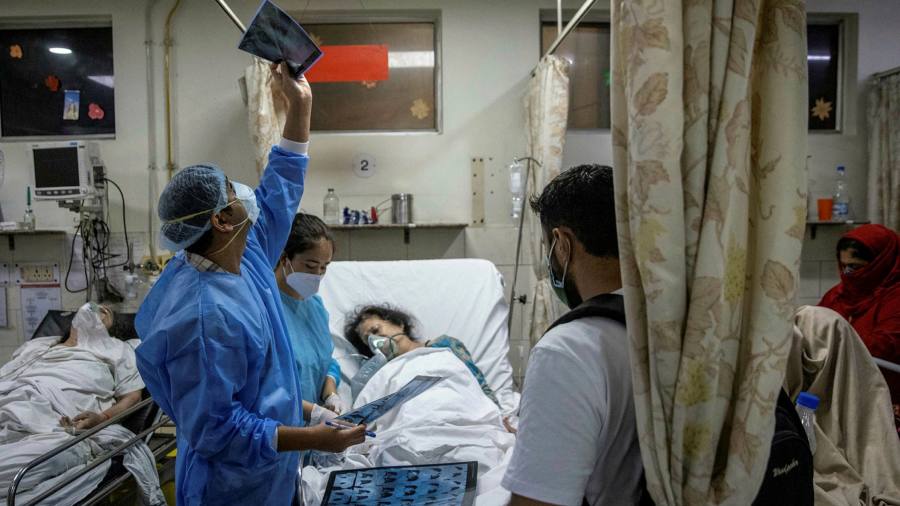As a foreign correspondent, my job is to tell India’s stories, not be part of them. But when I started feeling feverish while writing an article about Covid-19 vaccine policy last month, I had a gut feeling that the Sars-Cov-2 virus had found me.
I hoped it was exhaustion that I’d sleep off but the next day, still feverish, I was urged to take a Covid test. A leading diagnostic lab chain, which earlier had run an efficient home-testing service, had stopped answering its phones and responding to online requests. But a doctor friend persuaded one of the lab’s phlebotomists to collect my sample. Two days later, the results confirmed I was part of the ferocious coronavirus wave battering India and pushing its healthcare system to breaking point.
Over the following days, my physical symptoms remained mild. But it was still harrowing to be sick from a notoriously unpredictable virus knowing that drugs, hospital beds and oxygen were scarce. I suffered constant anxiety knowing I’d struggle to get medical help if I took a turn for the worse.
I quickly discovered that I’d been so focused on avoiding infection that I had no clue what to do once sick. A friend connected me to a Kolkata-based infectious disease specialist, who felt I was at low risk for severe illness. I’d had the first dose of a Covid vaccine 10 days before my fever started. But the doctor urged me to treat the illness aggressively from the start, given the chaos at hospitals.
He prescribed the antiviral drug, favipiravir, now undergoing clinical trials in the UK as a potential Covid-19 therapy but already approved in India for emergency use. Many of his patients had taken it, he said, and none suffered severely, including people in their 90s.
Normally, I’m reluctant to medicate. I knew favipiravir’s effectiveness as a coronavirus treatment wasn’t yet scientifically validated. But with hospitals turning away ailing patients, the logic of taking an experimental drug made sense. The challenge, I discovered, was to get hold of it.
I called five pharmacies, but all had run out of stock. A friend called six more to no avail. I panicked — the doctor wanted me to start the drug fast and Delhi was hours from the start of a weekend curfew. Then a friend, who’d heard I was Covid-19 positive, called.
“I’m looking for this drug,” I told her. “Any idea where I can get it?” She said she’d check. It turned out that people with foresight had prepared small emergency drug stashes. Her friend had such a stash and was willing to share it.
I was elated to get the pills to start treatment that night. But it wasn’t enough for the prescribed course. Days later I spent hours calling pharmacies in an unsuccessful hunt for more, before finally begging an industry friend to help.
My difficulties pale in comparison with the desperation, anger and grief beyond my sickroom. My Twitter feed was filled with pleas for hospital beds, oxygen cylinders, the antiviral remdesivir, plasma or a place in an intensive care unit. Top hospitals begged on Twitter for refills of dwindling oxygen supplies. Friends and many professional contacts were fighting for their lives. Doctor friends were weeping with impotent rage.
There was much grim news of death. A former Indian ambassador died after hours waiting in a hospital parking lot for admission; inpatients whose oxygen ran out; a top politician’s 34-year-old son, young journalists. Crematoriums struggled with an unprecedented flow of bodies.
I decided I had to tune out of the unfolding crisis, to ensure my physical recovery and to protect my mental health. I stopped checking Twitter. Newspapers piled up, unread.
Once I felt better and tuned back, I saw Narendra Modi’s government had cynically expanded eligibility for vaccination to all over the age of 18, despite an acute shortage of jabs.
And with thousands dying daily, often for want of medical help, the health minister was callously citing dubious official data to claim India’s Covid fatality rate was lower than richer countries — hardly consolation to grief-stricken families.
Today, I’ve recovered from my encounter with the virus. It will take far longer to get over the trauma of watching this calamity engulf the place I call home.

